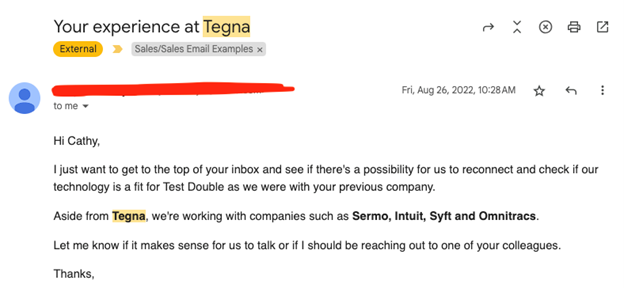How bad is it when a salesperson not only keeps emailing but also gets personalization wrong?
Consider this screenshot of an email I received:

You can see that someone tried for really stellar personalization—but unfortunately cited the wrong company! I worked at Gannett, and although Tegna was a spin-off, the divestment happened before I started.
That kind of thing is not new, but it's felt newly awful since the pandemic unpaused.
I'm now on a journey to dig into why sales enablement feels so bad and how we can make it good again.
When you collaborate with sales teams for over a decade, you have time to stop and reflect. Especially when ad tech and digital marketing have pushed things too far.
Sales enablement is like a dear aunt who loves you but can also ask super inconvenient questions. And Sales is like the frenemy whose social skills you admire. It's enough to make you wonder whether it would be easier to go it alone in marketing. (Psst: it's not.)
Sales outreach is a dumpster fire as a consequence of crowded inboxes, eroding trust, and bad actors. Invasive outreach is bad. Forced personalization gone wrong is bad. Vanilla-Ice-cold outreach is bad.
A Lesson From Community on Better Questions
When I do pause and reflect, I'm reminded of a corollary gifted to us by the TV series Community. Community college student Abed loves film but meets his match in the course "Nicolas Cage: Good or Bad?"
It's a question for the ages—whether you appreciate Nicolas Cage's acting or not. I often find myself revisiting that question structure. And it pops into my head as, "Sales: Good or Bad?"
Now, I'm not kicking Sales to the curb anytime soon. I've worked with some amazing, principled salespeople over the years.
But. BUT. We all know there's a lot of changes making sales not exactly a walk in the park. As marketers, we don't control Sales. We do control Sales enablement and influence Sales through that activity.
So... Sales Enablement: Good or Bad?
In marketing, this is where we go sideways by talking about tactics and best-practices: If we optimize better, people will fill out the form...
Maybe they will. And tactics have a place. (If you want to dig into demand generation, watch this amazing stuff from Kenda Macdonald.)
But optimizing automation workflows and CTAs won't address the root cause problem: B2B buyers are flooded with annoying sales messages they don't want.
So, what's a helpful marketer to do? Ask a better question.
Take "Nicolas Cage: Good or Bad?" The question assumes that the answer is either good or bad performance. That's super subjective.
Better question: when is Nicolas Cage using acting techniques to create an authentic response? Yes, that's in the weeds of acting methodology, but it's also objective. (I've got a BA in Theatre Arts—can you blame me for going there? If you're interested in this idea, check out this video from Wisecrack.)
In our world of Sales Enablement: Good or Bad, let's focus on something second nature to the MarketingProfs community: Are you using marketing techniques to create an authentic response? In ethical marketing speak: are you helping by offering something meaningful and relevant?
Back to Basics With First Principles
We can start to unpack those questions by taking things back to first principles. What works? What doesn't work?
Intentions are also important. What are we actually trying to do? Inspire an authentic response and help people who care about the same things you do.
What techniques help tilt our approach toward the good? What techniques take us straight to bad?
That feels like a lot of territory to navigate. If we "follow the bright spots," as the Heath brothers wrote about in Switch, we can look for times when we help people and reduce friction.
The 2022 Edelman & LinkedIn Thought Leadership Impact Report points to interesting silver linings:
- 90% of decision-makers cited referrals as effective at earning attention and consideration.
- 61% pointed to thought leadership as more effective than traditional marketing materials.
Businesses are also the only trusted institution in the 2023 Edelman Trust Barometer. Government? Nope. Nongovernmental organizations? Nope. The media? Nope. Only businesses.
That's awesome, right? Yes. It's also a lot of responsibility.
We need to be careful, or we'll lose the remaining trust we've got. Don't squander it with bad sales enablement à la an awkward Nic Cage moment. No more crappy sales outreach, please and thank you.
Lest you think I'm being as dramatic as Cage in Vampire's Kiss, that same Thought Leadership Impact Report pointed to an awful lot of bad content:
- ~4 in 10 respondents say there's more thought leadership than they can manage.
- 55% say if it doesn't catch their interest in the first minute, they're moving on.
- 56% say they file content away but never actually get back to it. (And isn't that depressing?)
Well, you better watch out, or your audience is going to be Gone in 60 Seconds.
There is a helpful lesson here: Stand out through referrals or content that grabs attention and keeps it.
Initial question: Is Sales enablement good or bad?
Better question: How can we spark interest and build trust?
That's the one true thing Marketing can do to support Sales. It is our guiding principle. Amazing things flow from interest and trust.
Interest and trust together create a space where we can help people think differently. When you do that, thought leadership content is almost like a warm intro. Or a referral based on aligning on what matters most! That's also what makes the Challenger Sale possible. And when done well, that's oh so very good.
So, we're going to get back to basics. Focus on creating compelling content with a clear point of view. Help people with content that is meaningful and relevant.
What Do You Do When They Don't Like Marketing, Either?
Here's an extra wrinkle: My target audience of software engineering teams does not like Sales. Or ads. Or marketing tracking. And that's lit a fire in me around how we connect as humans in marketing.
So I'm now on a journey to discover whether professional services Sales enablement can be empathetic, helpful, and privacy-minded.
In a series of MarketingProfs articles, I'm going to explore how to build a different kind of demand generation framework. And there might be some Nicolas Cage movie references to help illustrate a point or two. Because analogies help unlock critical thinking. And they're fun.
Along the way, I'll dig into...
- Refining brand positioning to hyperfocus on brand voice and the things clients value
- Setting up a private social community and sponsorships centered on community
- Hiring a senior content manager to drive content creation to the moon and back
- Structuring demand gen without intense automation (I'm all-in on opt-in)
Let's Do This—Together
If all that sounds... good, then follow along with me as I share my journey.
And if you're going through a similar journey, let's connect and explore together! You can find me in the Marketing Profs PRO Slack community and on LinkedIn.
As Maggie Smith said in Keep Moving:
"Throw away what you think you know. Throw away the old blueprint for something that will not be built. Instead, rethink that space. Now it can be anything: What will it be?"
More Resources on Sales Enablement
Five Ways to Improve Product Marketing and Sales Enablement Collaboration to Drive Revenue
How to Identify and Maximize Sales Enablement ROI [Infographic]
Five Types of Content to Include in Your Sales Enablement Playbook




